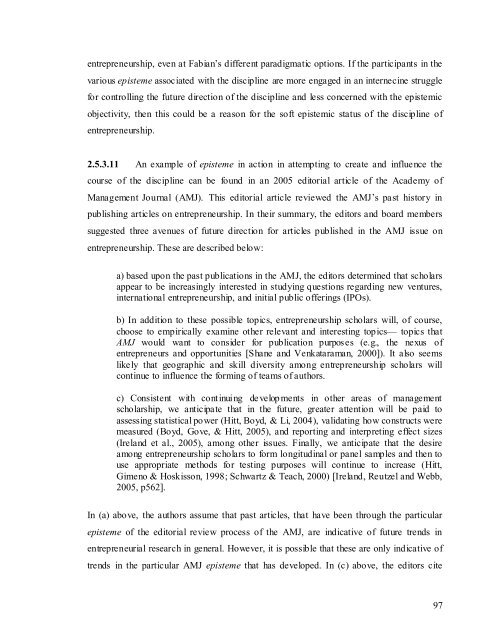Mapping the aliran of the academic discipline of entrepreneurship: A ...
Mapping the aliran of the academic discipline of entrepreneurship: A ...
Mapping the aliran of the academic discipline of entrepreneurship: A ...
You also want an ePaper? Increase the reach of your titles
YUMPU automatically turns print PDFs into web optimized ePapers that Google loves.
<strong>entrepreneurship</strong>, even at Fabian’s different paradigmatic options. If <strong>the</strong> participants in <strong>the</strong><br />
various episteme associated with <strong>the</strong> <strong>discipline</strong> are more engaged in an internecine struggle<br />
for controlling <strong>the</strong> future direction <strong>of</strong> <strong>the</strong> <strong>discipline</strong> and less concerned with <strong>the</strong> epistemic<br />
objectivity, <strong>the</strong>n this could be a reason for <strong>the</strong> s<strong>of</strong>t epistemic status <strong>of</strong> <strong>the</strong> <strong>discipline</strong> <strong>of</strong><br />
<strong>entrepreneurship</strong>.<br />
2.5.3.11 An example <strong>of</strong> episteme in action in attempting to create and influence <strong>the</strong><br />
course <strong>of</strong> <strong>the</strong> <strong>discipline</strong> can be found in an 2005 editorial article <strong>of</strong> <strong>the</strong> Academy <strong>of</strong><br />
Management Journal (AMJ). This editorial article reviewed <strong>the</strong> AMJ’s past history in<br />
publishing articles on <strong>entrepreneurship</strong>. In <strong>the</strong>ir summary, <strong>the</strong> editors and board members<br />
suggested three avenues <strong>of</strong> future direction for articles published in <strong>the</strong> AMJ issue on<br />
<strong>entrepreneurship</strong>. These are described below:<br />
a) based upon <strong>the</strong> past publications in <strong>the</strong> AMJ, <strong>the</strong> editors determined that scholars<br />
appear to be increasingly interested in studying questions regarding new ventures,<br />
international <strong>entrepreneurship</strong>, and initial public <strong>of</strong>ferings (IPOs).<br />
b) In addition to <strong>the</strong>se possible topics, <strong>entrepreneurship</strong> scholars will, <strong>of</strong> course,<br />
choose to empirically examine o<strong>the</strong>r relevant and interesting topics— topics that<br />
AMJ would want to consider for publication purpos es (e.g., <strong>the</strong> nexus <strong>of</strong><br />
entrepreneurs and opportunities [Shane and Venkataraman, 2000]). It also seems<br />
likely that geographic and skill diversity among <strong>entrepreneurship</strong> scholars will<br />
continue to influence <strong>the</strong> forming <strong>of</strong> teams <strong>of</strong> authors.<br />
c) Consistent with cont inui ng de velop ments in o<strong>the</strong>r areas <strong>of</strong> management<br />
scholarship, we anticipate that in <strong>the</strong> future, greater attention will be paid to<br />
assessing statistical power (Hitt, Boyd, & Li, 2004), validating how constructs were<br />
measured (Boyd, Gove, & Hitt, 2005), and reporting and interpreting effect sizes<br />
(Ireland et al., 2005), among o<strong>the</strong>r issues. Finally, we anticipate that <strong>the</strong> desire<br />
among <strong>entrepreneurship</strong> scholars to form longitudinal or panel samples and <strong>the</strong>n to<br />
use appropriate methods for testing purposes will continue to increase (Hitt,<br />
Gimeno & Hoskisson, 1998; Schwartz & Teach, 2000) [Ireland, Reutzel and Webb,<br />
2005, p562].<br />
In (a) above, <strong>the</strong> authors assume that past articles, that have been through <strong>the</strong> particular<br />
episteme <strong>of</strong> <strong>the</strong> editorial review process <strong>of</strong> <strong>the</strong> AMJ, are indicative <strong>of</strong> future trends in<br />
entrepreneurial research in general. However, it is possible that <strong>the</strong>se are only indicative <strong>of</strong><br />
trends in <strong>the</strong> particular AMJ episteme that has developed. In (c) above, <strong>the</strong> editors cite<br />
97

















